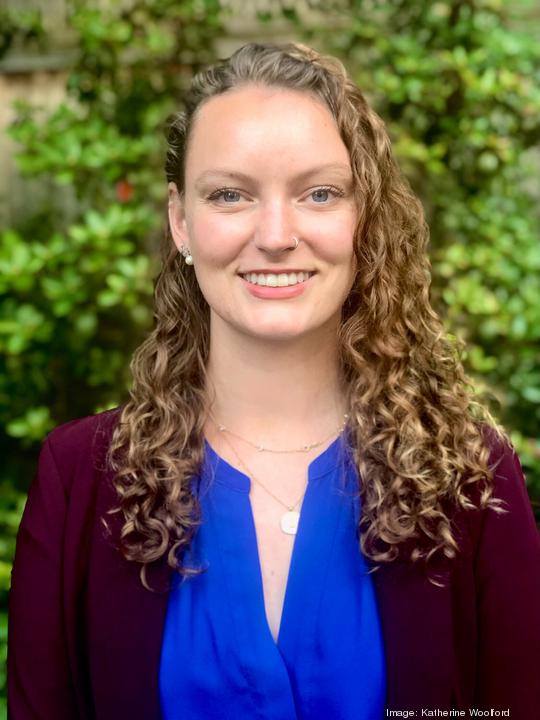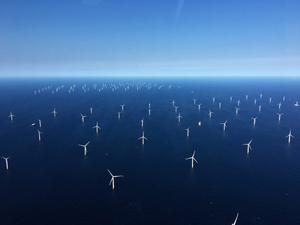
BlueSwell, New England's first incubator dedicated to early-stage bluetech startups, has a new program manager — and she wants to position the region as a leader in the ocean economy.
Katherine Woolford joined BlueSwell this month to head up the incubator's day-to-day operations, just as it gets ready to welcome its second cohort. Woolford comes from a background in environmental and sustainability research, including renewable energy access, sustainable fishing, regenerative agriculture, air quality and food waste. Now she wants to take what she's learned in academia and enable startups to commercialize technologies in those areas, leading New England to a more sustainable future.
"I think New England is going to be such a big leader in this, and we're going to build out this programming in a responsible, sustainable and equitable manner, because we need that," Wooldford said. "Our relationship with the sea is historic, but also, looking forward, I'm really confident New England will bring about that kind of positive change."
Inno recently caught up with Woolford to discuss her plans for BlueSwell, a project of the New England Aquarium and the bluetech startup platform SeaAhead, as the incubator gears up for a new batch of startups to be announced Sept. 14. This conversation has been lightly edited for length and clarity.
I wanted to start out by asking: You've got a background in environmental and sustainability research. What drew you to SeaAhead?
I did all my undergraduate summers studying blue carbon. Ocean science was my passion, snorkeling, scuba diving, all of that. But when I graduated from Princeton, I felt like I had the science background, but I needed to find something where I could do something with that, to effect change around climate change and sustainability science. I had just finished up a scholarship that was based at the Draper Richards Kaplan Foundation. What they do is venture philanthropy. With the foundation, I was working on their climate and sustainability portfolio, and helping figure out our sourcing and our evaluation of climate entrepreneurs. Quite a few were in the sustainable seafood and ocean tech space. That was really exciting with my background in blue science, bringing that to the foundation.
As my fellowship progressed, I was supporting the entrepreneurs in our portfolio, and quite a few were, once again, working on sustainable fisheries, whether it be tech or consulting engagements. I was helping them to scale. I really enjoyed this type of entrepreneur support, building the relationships and solving problems. That's what SeaAhead and BlueSwell are trying to do, is to support entrepreneurs in the ocean science ecosystem, figure out how they can get whatever brilliant idea they have — this product or this mechanism — and impact the oceans positively. They have the technology, but they need this business knowhow.
I was really excited to join on with BlueSwell as the program manager and build out this programming to create that strong sense of community, and then show this second cohort all that New England has to offer in terms of infrastructure in the area.
I'm glad that you pointed out that need for support because climate tech as a whole, and especially this new emerging field of bluetech, has historically been underrepresented in the startup world and has been underfunded, especially over the last decade. I'm wondering what you see as SeaAhead's role in building that support back up and how you plan to integrate that into your programming.
With the historical underfunding, there's definitely lots of infrastructure in academia and research, but getting things out of the lab and into commercialized product is what we need to really accelerate the expansion of the potential impact of any of these products and endeavors.
With our partnership with New England Aquarium, they are a national nonprofit leader with conservation expertise and scientists, and we're bringing our networks of business support and business knowhow and how to run a small startup. Combining those two together is going to really accelerate and expand the opportunities that these young startups can have to grow in the space.
SeaAhead has a strong presence in both Greater Boston and Rhode Island. How do you hope to connect those two hubs going forward?
We're really lucky to be members of the Cambridge Innovation Center. That's where our offices are based. We have Boston, Kendall Square and Providence offices. I think one of the biggest transformations for the second cohort of BlueSwell is taking advantage of more time in person together and planning site visits across the New England seaboard, creating that sense of community and showcasing all that we have to offer.
With Rhode Island, the industries that we're looking at for these startups — the problems that they're solving, the solutions that they're finding — are really entrenched in these industries that Rhode Island has a history of. You have fishing and shellfish farming, making sure the beaches are pristine, but also industries newer to the state, like kelp farming and offshore wind. It's the Ocean State, so all of the ocean work that we're doing in this regional effort is going to have local impact as well.
That transitions really nicely into my next question, which is: What do you see as the role of Rhode Island-based startups in this emerging bluetech economy?
We are encouraging local founders to apply for our cohort because we really want to have that access and opportunity to see each other in person. Rhode Island's innovation system as well, with the universities and policies across New England, we really think that there's strength in this community. It's like one plus one is greater than two. No one state is working alone. It's affecting all of us, and I think that that's a really fabulous, special thing you get with these close-knit regional states. It's all interconnected. That's a really exciting opportunity, that each one's history, knowledge, networks and policies are all going to affect the other. That's why we do have to work together.
With something as big as trying to slow climate change, it is a public problem. We all have to depend on one another.
Absolutely. I'm so excited to have joined SeaAhead in this effort to bring bluetech up, especially in New England. We're changing the public awareness of it as more than just green science. It has such a range, from city planning to offshore wind. I think New England is going to be such a big leader in this, and we're going to build out this programming in a responsible, sustainable and equitable manner because we need that. Our relationship with the sea is historic, but also, looking forward, I'm really confident New England will bring about that kind of positive change.






